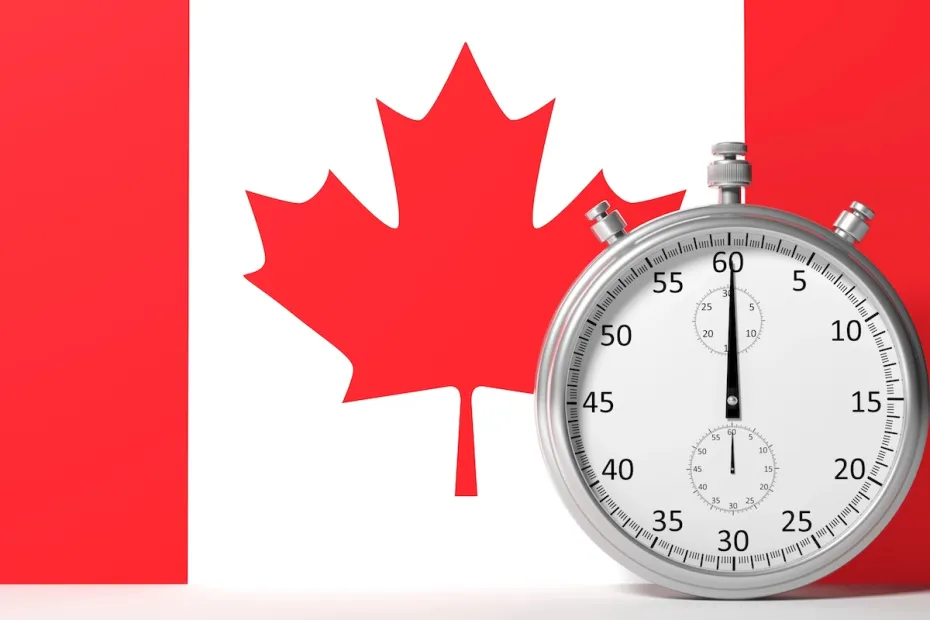Canadian immigration processing times see significant improvements as IRCC tackles massive application backlog with streamlined procedures
On This Page You Will Find:
- Breaking updates on IRCC's August 2025 processing time reductions
- Critical timeline changes affecting 2+ million pending applications
- Expert strategies to avoid the delays plaguing 20% of applicants
- Insider knowledge on which visa categories are moving fastest
- Proven methods to expedite your application through the system
Summary:
Immigration, Refugees and Citizenship Canada (IRCC) has dramatically updated processing timelines as of August 27, 2025, bringing relief to millions waiting for decisions on visitor visas, permanent residency, and citizenship applications. With over 842,800 applications in backlog and 2 million total cases under review, these changes represent the most significant processing improvements in years. From Super Visa extensions to citizenship grants, understanding these new timelines could save you months of uncertainty and help you plan your Canadian journey with confidence.
🔑 Key Takeaways:
- IRCC processed 825,600 work permits and 317,800 study permits from January-July 2025
- Super Visa processing times increased for high-demand countries like Pakistan and the U.S.
- Visitor visa extensions showed significant improvements across all categories
- Citizenship processing remains stable with slight improvements in specialized services
- Applications submitted before June 23, 2025 should expect acknowledgment receipts soon
Maria Santos refreshed her IRCC account for the hundredth time this month, her work permit extension still showing "in progress" after 12 weeks. Like millions of hopeful immigrants, she's been caught in Canada's immigration processing maze—but the landscape just shifted dramatically.
If you've been waiting anxiously for news about your Canadian immigration application, August 2025 brought the most comprehensive processing time updates in recent memory. These aren't minor tweaks—they're substantial changes that could affect when you receive your decision, when you can reunite with family, or when you can finally call Canada home.
The Numbers That Tell the Real Story
Between January 1 and July 31, 2025, IRCC accomplished something remarkable: they finalized 825,600 work permit applications and 317,800 study permit applications (including extensions). That's over 1.1 million decisions in just seven months—a processing pace that suggests the system is finally catching up to demand.
But here's what those numbers really mean for you: IRCC welcomed 246,300 new permanent residents during this period while making 266,800 total PR decisions. The slight difference indicates they're not just maintaining the status quo—they're actively reducing backlogs.
The reality check? At any given moment, IRCC manages over 2 million applications across all categories. Your application is competing for attention in this massive pool, which makes understanding the new processing priorities absolutely crucial.
What Changed in August 2025 (And Why It Matters to You)
Super Visa Processing: A Mixed Bag
If you're sponsoring parents or grandparents from Pakistan, India, or the United States, you've likely noticed longer wait times. The Super Visa category has seen "notable increases" in processing times for these high-demand countries. This isn't necessarily bad news—it often indicates IRCC is being more thorough with applications from regions with higher volumes.
What this means for your family: Plan for extended timelines and ensure your application is absolutely complete. Incomplete applications from high-demand countries face even longer delays.
Visitor Extensions: The Bright Spot
Here's some genuinely good news: visitor visa extensions have improved significantly across the board. If you're already in Canada and need to extend your stay, you're looking at faster processing than visitors from previous months experienced.
This improvement suggests IRCC has streamlined their extension processes, recognizing that people already in Canada (and contributing to the economy) deserve efficient service.
Citizenship Processing: Steady as She Goes
Citizenship grants and certificate processing remain stable, with slight improvements in specialized services like renunciation requests and record searches. If you applied for citizenship before June 23, 2025, you should receive your Acknowledgment of Receipt (AOR) soon—a critical milestone that confirms IRCC has your complete application.
The 80% Rule: What IRCC Isn't Telling You
Here's something most applicants don't understand: IRCC's processing times reflect how long it took to process 80% of applications in the past. This means 20% of applications take significantly longer than the posted times.
What puts you in that unlucky 20%?
- Incomplete applications (the leading cause of delays)
- Applications requiring additional verification
- Submissions from countries with complex security screening requirements
- Applications with unique circumstances requiring officer review
The key insight: these aren't guarantees, they're historical averages. Your actual processing time depends on factors largely within your control.
The Backlog Reality: 842,800 Applications and Counting
The July 2025 backlog figure of 842,800 applications represents both a challenge and an opportunity. It's a challenge because it means significant competition for processing resources. It's an opportunity because IRCC has clearly prioritized reducing these numbers, as evidenced by their aggressive processing pace in 2025.
If you're wondering whether to submit your application now or wait for "better times," consider this: IRCC is currently processing applications at one of the fastest rates in recent history. Waiting likely means joining an even larger pool of applicants later.
Geographic Disparities: Location Matters More Than You Think
Applications from outside Canada or the United States may face additional delays. This isn't discrimination—it reflects the practical realities of document verification, security screening, and communication across time zones.
If you're applying from outside North America, build extra time into your timeline and be especially meticulous about documentation. Consider using certified translation services and ensuring all documents meet IRCC's specific formatting requirements.
Expert Strategies to Navigate the New Landscape
1. Stay Connected to IRCC's Update Schedule
IRCC publishes weekly updates for temporary visas and PR cards, and monthly updates for citizenship, permanent residency, and family sponsorships. These aren't just bureaucratic announcements—they're strategic intelligence about processing priorities and potential delays.
2. Front-Load Your Application Preparation
With over 2 million applications in the system, incomplete submissions face exponentially longer delays. Invest time upfront in ensuring every document is perfect, every form is complete, and every requirement is met.
3. Understand Category-Specific Trends
Work permits are processing faster than study permits, visitor extensions are improving, and citizenship applications show stable timelines. If you have flexibility in timing or category selection, these trends should inform your strategy.
The Bigger Picture: What These Changes Signal
IRCC's August 2025 updates represent more than administrative adjustments—they signal a system adapting to unprecedented demand while maintaining security and thoroughness. The agency processed over 1.1 million temporary resident applications in seven months while welcoming nearly a quarter-million new permanent residents.
This processing velocity, combined with targeted improvements in visitor extensions and stable citizenship timelines, suggests IRCC has found its rhythm after years of pandemic-related disruptions.
What You Should Do Right Now
If you're planning to apply, these processing time improvements create a window of opportunity. IRCC is clearly prioritizing efficiency while maintaining their quality standards.
If you're already waiting, use this time productively. Ensure your contact information is current, gather any additional documents you might need, and stay informed about category-specific updates that could affect your application.
The immigration landscape is shifting in applicants' favor, but only for those who understand how to navigate the new realities. Your Canadian dream is closer than it's been in years—if you know how to position yourself in this evolving system.
FAQ
Q: Are the new processing times reliable, or will IRCC change them again in a few months?
IRCC's August 2025 updates reflect real operational improvements, not wishful thinking. The agency processed over 1.1 million applications in just seven months, proving they have the capacity to meet these timelines. However, these times represent how long it took to process 80% of recent applications—they're historical averages, not guarantees. To protect yourself from potential delays, submit complete applications with all required documents and build a 20-30% buffer into your personal timeline. IRCC updates processing times based on actual performance data, so consistent improvements suggest sustainable changes rather than temporary fixes.
Q: My application is from Pakistan/India where Super Visa times increased—does this mean IRCC is discriminating against certain countries?
Longer processing times for high-volume countries like Pakistan, India, and the U.S. reflect operational realities, not discrimination. These countries generate significantly more applications, requiring additional resources for document verification and security screening. IRCC processes applications in the order received while ensuring thorough review for all applicants. To mitigate delays from high-demand countries, ensure your application is absolutely complete, use certified translation services, and provide all supporting documents upfront. Consider applying during traditionally lower-volume periods (avoid peak seasons like spring and summer) and maintain realistic expectations based on your country's current processing trends.
Q: I've been waiting longer than the posted processing time—should I be worried my application was lost or rejected?
Processing times represent 80% of applications, meaning 20% naturally take longer due to complexity, additional verification needs, or unique circumstances. If you've exceeded the posted timeline, this doesn't indicate rejection or loss—it often means your application requires additional officer review. First, check your online account for any requests for additional information you might have missed. Contact IRCC only after exceeding the processing time by at least 25%, as earlier inquiries won't expedite your case. Keep your contact information updated and respond immediately to any IRCC communications. Applications requiring extra scrutiny often result in approvals once the additional review is complete.
Q: With 2+ million applications in the system, how can I make sure mine doesn't get buried in the backlog?
While you can't jump the queue, you can avoid the common mistakes that cause 20% of applications to face extended delays. Submit complete applications with every required document, use IRCC's document checklist religiously, and ensure all forms are filled out completely. Pay fees correctly and include clear, legible copies of all supporting documents. Respond to any IRCC requests within the specified timeframe—delayed responses restart your processing clock. Most importantly, avoid the temptation to submit multiple applications or contact IRCC unnecessarily, as this can actually slow your processing. The 842,800 backlog is being actively reduced, as evidenced by IRCC's aggressive 2025 processing pace.
Q: Should I wait to apply until processing times improve further, or apply now?
Apply now. IRCC is currently processing applications at one of the fastest rates in recent history—over 1.1 million decisions in seven months. Waiting means joining an even larger pool of future applicants as immigration demand continues growing. The current processing improvements reflect systemic changes, not temporary fixes, making this an optimal time to submit. Additionally, most immigration programs have annual caps or quotas, so earlier applications have better chances of selection. If you wait for "perfect" conditions, you'll likely face longer delays and increased competition. The key is submitting a complete, high-quality application during this period of improved processing efficiency rather than hoping for even better times that may not materialize.
Q: How do I know if my application category will be processed faster or slower than the posted times?
Track IRCC's category-specific trends and your personal risk factors. Currently, work permits are processing faster than study permits, visitor extensions show significant improvement, and citizenship applications remain stable. Applications from outside North America typically face longer timelines due to verification requirements. Your processing speed depends on application completeness (incomplete applications face exponential delays), country of origin (high-volume countries like India, Pakistan, and the U.S. may take longer), and complexity of your case. Monitor IRCC's weekly updates for temporary visas and monthly updates for permanent residency to spot emerging trends. If your profile matches faster-processing categories (complete application, straightforward case, applying from within Canada), you'll likely see times at or below posted estimates.
 RCIC News.
RCIC News. 
